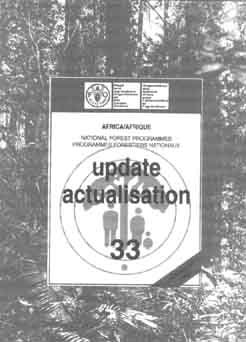
European Tropical Forestry Advisers' Group and Forestry Advisers' Group meet in Edinburgh
The 7th meeting of the European Tropical Forestry Advisers' Group (ETFAG) and the 26th meeting of the Forestry Advisers' Group (FAG) were held in Edinburgh, the United Kingdom, from 20 to 23 October 1998.
ETFAG is an informal group of forestry experts from the European Commission and its member governments. The purpose of the ETFAG meetings is to enhance information exchange, problem identification and liaison, thus providing opportunities for action. The group examines and discusses relevant strategic issues concerning tropical forestry.
FAG is an informal open and voluntary group of forestry advisers/officials working in a range of public service institutions and organizations. Key elements of its mission are to:
· support national forest programmes and in-country coordination in developing countries and in countries with economies in transition;· exchange information, networking and joint studies;
· develop substantive issues and approaches with regard to national forestry programmes.
ETFAG
The ETFAG session first reviewed European Commission (EC) business and news relevant to tropical forests. Items discussed included:
· reorganization of the External Relations Directorate Generals of the EC and its implications for ETFAG;· evaluation of the EC Tropical Forestry Programme (including the Rainforest Foundation);
· the EC tropical forestry regulation and budget line. A report was distributed presenting the synthesis of the findings of an evaluation of EC development cooperation in tropical forestry projects between 1990 and 1996. Also distributed was a list of countries and regions where forestry has been identified as a potential area for development cooperation in the national or regional indicative programmes for financing under the 8th European Development Fund;
· a European Union-wide information system providing information on tropical forestry activities funded by the European Commission. The system, a full elaboration of the pilot effort Tropical Forestry Projects Information System (TROPICS) is scheduled to be ready by March 1999;
· a proposed policy paper on Tropical Forest Communication to be produced by the EC;
· a successor programme to INCO-2 on Tropical Forest Research.
The participants then discussed collaborative work in progress and received updates on the projects related to the Congo basin, Guiana shield and Southern African Development Community (SADC) initiatives and Indonesian forest fires. EC-funded projects being implemented by FAO include Data Collection and Analysis for Sustainable Forest Management for African and Caribbean member countries of the African, Caribbean and Pacific States (ACP); and the just-completed project, Forestry Policies in the Caribbean. Project proposals being submitted by FAO for consideration included a follow-up effort, Sustainable Management in African ACP Countries, as well as similar efforts for South Asia, Southeast Asia and Latin America.
The participants also discussed at length the upcoming EC project, Capacity Building for National Forestry Programmes in Africa, to be implemented by the African Academy of Sciences. This project will cover 12 selected countries and include training and networking activities related to policy analysis and planning.
The participants also considered the new European Union (EU) Tropical forestry sourcebook, a commercial publication issued by the Overseas Development Institute (ODI) in the United Kingdom, examining the decision-making process behind EC and member country funding of bilateral aid to tropical forests, and the outcome of these efforts. In this regard, the participants noted that two-thirds of the world's bilateral aid to tropical forests comes from the EC and its member countries.
Copies of the full report of the ETFAG meeting may be obtained through: M. Stewart, 8th EFAG Coordinator, National Research Institute, Chatham Maritime, Chatham, Kent ME4 4TB, United Kingdom.
FAG
The FAG meeting had a wide-ranging agenda covering a number of initiatives related or relevant to national forest programmes. Among the most important items, participants considered:
· the Intergovermental Panel on Forests/Intergovernmental Forum on Forests (IPF/IFF) process and the second meeting of IFF;· possible follow-up to the six-country initiative under which three developed and three developing countries had joined forces to consider mechanisms for practical implementation of the IPF action proposals. Particular attention was devoted to the need and opportunity for revision of the Practitioner's Guide produced by the initiative;
· the Canada-Costa Rica initiative for international arrangements and mechanisms to promote the management, conservation and sustainable development of forests, aimed at refocusing the debate on the merits of a binding international agreement;
· progress in the FAO survey on Status and Progress in the Implementation of National Forest Programmes, and a report from FAO on the Latin American workshop on international cooperation and resource mobilization for national forest programmes.
Copies of the full report of the FAG meeting may be obtained from the meeting convenor: M. Määttä, FAG Secretariat, Finnish Forest and Park Service, PO Box 94, 01301 Vantaa, Finland.